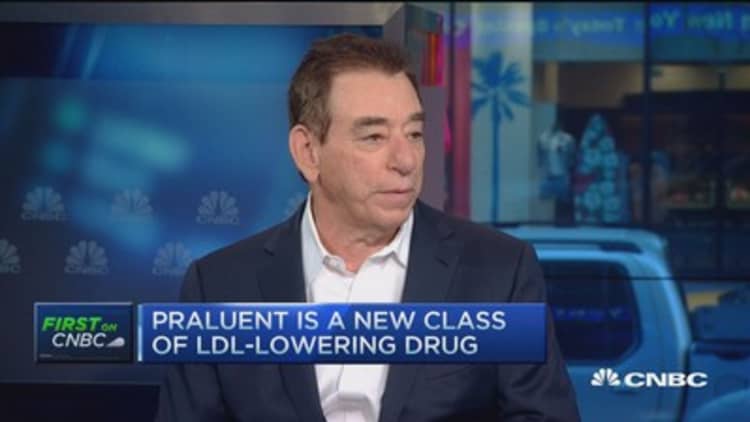
Federal health advisers have recommended approval for a highly anticipated cholesterol drug from Sanofi and Regeneron Pharmaceuticals, but with the caveat that more data is needed about its long-term ability to reduce heart attacks.
Regeneron CEO Leonard Schleifer said Wednesday the debate over Praluent boiled down to a question over whether drug makers can win FDA approval on the basis that the medication lowers LDL cholesterol, which is widely known as "bad cholesterol."
"Some of the panelists struggled with that because there were some other classes of drugs where that hasn't actually worked out so well," he said on CNBC's "Squawk Box." "But I think the class of drugs represented by Praluent—the PCSK9 inhibitors—have such a strong foundation in genetics. It's really a triumph of genetics and modern approaches to validating drug targets."
The expert panel voted 13-3 on Tuesday that the Food and Drug Administration approve the injectable drug.
But in an unexpected development, a number of panelists said the drug should only be used in patients with abnormally high cholesterol levels caused by an inherited disorder. Those panelists said they wanted to see more data about whether the drug ultimately reduces heart problems, before it is used more broadly.
Read More
"I personally fall on the side of having optimism, but I need to see the cardiovascular outcome study to know," said Dr. Philip Sanger of Stanford University, who voted for the drug.
If the FDA follows the group's recommendation, the drug could be approved for a much smaller population than its developers have proposed.
Praluent is part of a new class of injectable drugs that lower cholesterol more than older medications called statins, which have been the standard treatment for more than 20 years. A similar drug from Amgen will go before the same panel on Wednesday.
Regeneron's drug differs from Amgen's in that it allows doctors to prescribe either a high or low dose, whereas Amgen offers just one dose. Schleifer said Regeneron wanted to offer flexibility because PCSK9s demonstrate an ability to bring cholesterol down to potentially unhealthy levels.
"We're getting into uncharted territory. We're seeing LDL cholesterols of 10 or 15, and people who have familial hypercholesterolemia have 400 or 500," he said. "So you're seeing dramatic lowering into uncharted territories."
Read More Obama touts health law as Supreme Court decision looms
Both drugs block the substance PCSK9, which interferes with the liver's ability to remove cholesterol from the blood. Analysts expect the drugs to grow into blockbuster sellers, generating billions of dollars in new sales. But Tuesday's meeting underscores the uncertainty about who should receive such medications.
Statins should remain the first choice for most cholesterol patients, Schleifer said. There may be as many as a million Americans with familial hypercholesterolemia—a condition passed down in families that results in high LDL levels—for whom PCSK9 inhibitors are appropriate, he added. However, only 10 or 20 percent of those people may be diagnosed.
Another class of patients PCSK9s may help, said Schleifer, are the "many millions more" who are at high-risk of cholesterol related health problems and already take the maximum tolerated dose of statins.
More than 73 million U.S. adults, or nearly one-third, have high LDL cholesterol, according to the Centers for Disease Control and Prevention. Those patients have twice the risk of heart disease, the leading cause of death in the U.S.
Paris-based Sanofi and Regeneron, which is based in Tarrytown, New York, have suggested marketing their drug to a large group of patients, including those who are at high-risk for heart attacks and those who cannot tolerate statin drugs due to side effects.
—CNBC's Tom DiChristopher contributed to this story.

